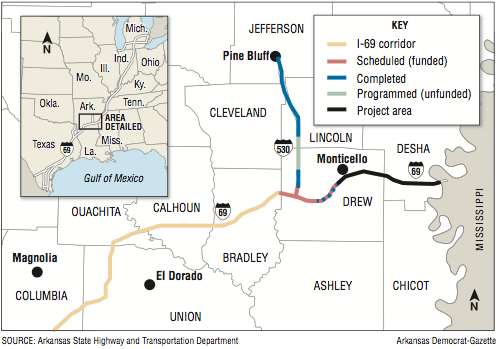Supporters of the long-planned Interstate 69 corridor through southern Arkansas haven't given up on seeing the 189-mile section built.
But it is easy to see why it remains a daunting task though 25 years have passed since its designation by Congress as a "high-priority corridor of national significance."
I-69 is a 2,680-mile international and interstate trade corridor extending from Mexico to Canada. From Mexico to Indianapolis, the proposed corridor will be about 1,660 miles, including the 189 miles in Arkansas.
It will cost an estimated $30 billion to complete. The Arkansas portion is estimated to cost $3 billion, according to the Arkansas Highway and Transportation Department.
So far though, work on the route has been relatively modest:
• Nearly $200 million has been spent on developing the I-69 Connector, also called Future I-530, extending south from Pine Bluff.
• Work is progressing on the Monticello Bypass. Projects worth $8.5 million are under construction with another $79 million in projects scheduled.
On Thursday, more than 100 people from Arkansas, Mississippi, Louisiana and Tennessee attended a meeting that Robert Moore, a member of the Arkansas Highway Commission from nearby Arkansas City, said represented a "new day for I-69" in Arkansas.
The meeting was held at the Delta Conference Center and Resort just north of McGehee off Arkansas 1 in Desha County, not far from a sign denoting where the corridor crosses the highway and identifying it as "Future I-69."
The "new day" hinges on an application the state has made for discretionary federal transportation money to apply to the route. If the application is successful, the federal money, combined with state money, would total $25 million and go toward development and right of way acquisition on the corridor segment between the Monticello Bypass and the Mississippi River.
Moore said the impetus behind the new initiative is to get the proposed Great River Bridge built. The estimated cost of that bridge, which includes more than 20 miles of approaches, is estimated at $1.3 billion. Arkansas' portion is about $910 million because the approaches are needed on the Arkansas side.
"We've come to believe the way we're going to do that is get a good footprint," Moore said. "We get a good footprint on the west side of the river and a good footprint on the east side of the river, we'll find the will to cross it."
Finding a way to get the bridge built should be priority, according to Lo Walker, president of the I-69 Mid-Continent Coalition.
Thursday's meeting was the culmination of nearly two years of work by Dan Flowers, the former Highway and Transportation Department director who is volunteering to lead Arkansas I-69 Coalition efforts.
The meeting featured Jeff Lindley, an associate administrator for the Federal Highway Administration in Washington, D.C.
"I've been around long enough to remember when I-69 was an idea -- just a line on a map," he said. "It wasn't real.
"There is a lot that happened, a lot of investment has been made. There's a lot left to do."
But the I-69 corridor in Arkansas is competing with other transportation projects around the nation. Of 800 applications for one grant program, he said, 600 are good applications. Of those, 300 "were outstanding," he said. But under the terms of the program, only 50 could be selected.
The application for the corridor project not only has to be a "game changer," it has to use numbers to show the project is (a game changer)," he said. "How many lives will it save? How many crashes won't happen if the corridor is built?"
"I think you've got that in I-69," Lindley said.
The stakes are too large to not focus on getting I-69 built, other attendees said.
State Rep. Lane Jean, R-Magnolia, who helped establish an I-69 caucus in the Legislature, said the corridor isn't just "Future I-69" but represents the future of the region as well, and area civic and political leaders have to acknowledge that.
"There's nothing else we can do to help our people than build this highway through the Delta," he said. "We've got to be committed. We've got to have fire in our belly."
Building the interstate will bring opportunities for development for the region as well as the state, he and others said.
Land available for helping attract industry is not as plentiful as it once was on the state's other two principal interstate corridors, Interstate 30 and Interstate 40, according to Mike Preston, the executive director of the Arkansas Economic Development Commission.
"We can't do economic development without infrastructure in place," Preston said. "We will get passed by."
Jonathan Barnett, a former state Highway Commission member and legislator from Siloam Springs, said developing the corridor has wider implications beyond southeast Arkansas.
He cited the widening of the Panama Canal that will bring more shipping to ports in Texas and Louisiana. The truck traffic that additional shipping will generate, for now, will be going to I-30 and I-40 and simply add to the congestion, particularly on I-30.
"We need I-69," Barnett said.
Flowers said no one knows what the future will bring. He recalled traveling on U.S. 71 between Alma and Fayetteville with his wife when she asked him if what is now Interstate 49 would ever get built.
"Not in my lifetime," he replied.
But not long afterward, former U.S. Rep. John Paul Hammerschmidt, R-Ark., came up with $100 million in federal money for the route. The state Highway Commission, recognizing the significance of the unexpected largess, came up with the rest and the interstate was built in a relatively short nine years, Flowers said.
Something like that could happen for I-69, he said. "We've got to be ready."
Metro on 06/13/2016

